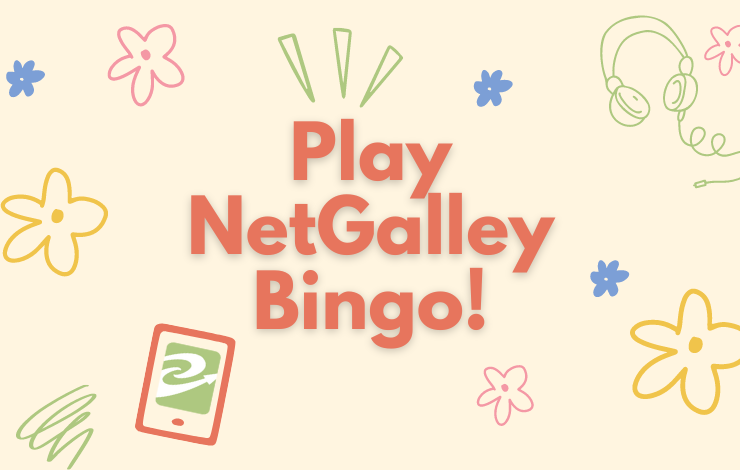Gather round, readers! The NetGalley team loves sharing our insight and wisdom to help you become the best book advocates you can be. Through the We Are Bookish newsletter and NetGalley social channels, we asked members to share all of their burning questions about ARCs. Here we tackle the most frequently asked questions about what ARCs are, the NetGalley approval process, when to submit a review, and more!
What’s the difference between an ARC, a DRC, and an ALC?
ARC
ARC is an acronym that stands for “advance reader copy.” ARCs are released pre-publication to select readers at the discretion of the publisher. It’s a broad term used to encompass various formats (such as physical, e-books, and audiobooks). You may also hear the terms galley or uncorrected proof used interchangeably with ARC—learn more about galleys in our publishing glossary!
DRC
A DRC is a “digital review copy,” meaning it comes in a digital reading format. Similar to an ARC, this is a copy provided in advance of the publication date to readers who need early access. Occasionally you’ll see early digital copies referred to as “eARCs,” but DRC is the more common industry term.
ALC
ALC is a newer term that refers to audiobooks and stands for “advance listening copy.” Audiobooks take a significant amount of time to record and produce, so you’ll notice that ALCs are typically shared with early reviewers much closer to a book’s publication date.
Find more publishing terms here!
How can I receive ARCs?
If you are a reviewer, book trade professional, bookseller, educator, librarian, journalist, or member of the media, you can use NetGalley for free to Request and read DRCs and ALCs! Check out our sign-up guide here to learn more.
What’s the difference between an ARC and a book that is available for purchase?
There is the potential for elements of a book to change between the ARC (advance reader copy) stage and the finished book. This could include small changes like moved commas, reworded sentences, and general polishing. Sometimes a cover might get a slight update such as the addition of a blurb from another author or a sticker if the book has been picked up by a major book club.
One of the many reasons early reviews are so helpful is because the publisher and author have time to make a change to improve the book based on this early feedback. But overall you’re unlikely to see major plot or character changes between a DRC available on NetGalley and a finished book.
How do you decide which ARCs are on NetGalley?
Each publisher on NetGalley decides which books to upload, when to upload them, and when to archive them. They also have full control to decide when and whether to approve requests for their books. The books you see on NetGalley are typically there because they’re at a phase in their publishing journey where they have gone through most rounds of edits and are now ready to be seen by early reviewers.
Keep in mind that a book’s availability and visibility may be determined by the country you live in or your member type. Publishers are in full control over their region preferences and availability settings on NetGalley. Many publishers sell rights to publish editions in other territories, so they may not have permission to grant access if you are located in a region outside of their territory rights.
How does the ARC approval process work?
When a publisher signs in to NetGalley, they’re able to see how many pending Requests they have for each of their books. From there, every publisher operates differently, depending on their own internal workflows and strategies. Some may focus on member type at first, while others might sort by Feedback Ratio.
Estelle Hallick, the Director of Publicity and Marketing at Forever, gave us a glimpse into how she manages Reviewer approvals in our interview: “I always start by looking at the Feedback Ratio; I sort the [Requests] and start the approval process with the highest numbers… When I start to get below 80%, I begin reading through bios. I tend to give more attention to the people under 80% because I’m genuinely interested to know why they are requesting the title or what brings them to NetGalley.”
Here are some of our tips on how to get approved on NetGalley!
What are the most common reasons publishers may decline a request for an ARC?
There are a few reasons a publisher may decline a request which members have the ability to change! A low Feedback Ratio or Profile issues (missing information, broken links, incomplete) are easy things for you to update.
Then there are reasons that have to do with how publishers use NetGalley: Publishers often run campaigns that target specific member types. They may start by only approving Librarian Requests, and then move on to Reviewer Requests once it’s a bit closer to pub date. Also, an incorrect member type could cause a publisher to decline a request. For instance, a Reviewer who posts on social media who is incorrectly categorized as Media (a member type meant for journalists). If you realize you have the incorrect member type, contact us so we can help change it.
Another possibility is that the publisher may have reached their approval limit for that particular book. Some publishers have a cap on the number of free books they will offer. This is likely to be based on the specific book, author, or campaign.
I’ve followed all of the Profile and review writing tips, have a high Feedback Ratio, share my reviews widely, and still get denied sometimes. How come?
While it can be disappointing to not be approved for an anticipated book, remember that it isn’t a personal decision. One of the most popular books on NetGalley last year had nearly 10,000 individual Requests for access! A publisher’s job is to get their book into the hands of book advocates of all member types, and that means sometimes making hard decisions. The good news is that you can always continue to support the author by buying the book when it goes on sale and/or by requesting it from your library.
When is the best time to leave a review for a NetGalley ARC I was approved for?
Many members want to know if they should review a book they’re approved for as soon as they’re able or closer to the date it’ll be published. The truth is that the best time to submit a review is shortly after you’ve finished the book and your thoughts on it are fresh in your mind.
Reviews posted shortly after a book is made available on NetGalley can help to create early buzz and encourage Requests from your fellow NetGalley members. Early reviews can also help publishers shape their marketing strategies.
Reviews shared before the pub date can help spark pre-orders. Reviews shared on the pub date can inspire a reader to visit the bookstore. No matter when you submit your review you’re helping the author, publisher, and book community with one of these goals.
If the publisher does have a specific timeframe for submitting your review and/or sharing your review publicly, they’ll share it with you in the approval email—so make sure you read it over carefully. If the publisher doesn’t specify, then we advise you to try to submit and share your review publicly around the pub date.
What information do I need to disclose in an ARC review that I’m posting outside of NetGalley?
For the sake of transparency, readers are encouraged to disclose if the book they’re reviewing was gifted to them. A simple line such as this works perfectly: “Thank you NetGalley and [publisher] for sending this book for review consideration. All opinions are my own.”
Disclosing this information not only makes your relationship with the publisher or author clear, it also lets readers know that you are specifically discussing a version of the book that was not final and that some changes may occur before the official printing. For this reason, it’s helpful to share if you’re reviewing an ARC or DRC and if you’re reviewing the ALC don’t forget to talk about the performances of the narrators!
You don’t need to mention the device you read it on.
Are critical ARC reviews valuable to publishers?
Publishers want thoughtful reviews, which can include glowing and critical reviews. As long as the review is presented in a professional, respectful manner, a critical review can be helpful to the publisher. In our interview with Cynthia Shannon, the former Senior Marketing Manager of Food and Lifestyle at Chronicle Books, she shared a story about how critical early reviews of a cookbook helped change her team’s marketing plan! Plus, as we mentioned above, the ARC is not a final version of the book, and early feedback does have the potential to impact the finished book.
Both positive and critical reviews are also incredibly important for future books. A publisher can look at the feedback you shared and keep it in mind for an author’s future books, as well as other books that they acquire, edit, and market.
Though members often think positive reviews are the easiest way to convince someone to read a book, a critical review can have the same effect. For example, one member’s criticism of a fantasy book feeling too similar to The Lord of the Rings could inspire a Tolkien fanatic to pick it up!
Where do publishers expect NetGalley members to share ARC reviews?
Publishers understand that every NetGalley member’s strategy for using the site and accessing DRCs and ALCs differs depending on their member type, profession, etc.
If you receive a DRC or ALC via NetGalley, you should submit Feedback on NetGalley—publishers may not approve Requests from members who don’t provide Feedback.
Share your review on the platforms that make the most sense for you. These can be places such as retail sites like Amazon and Barnes & Noble, book reviewing sites like Goodreads and The StoryGraph, or social media platforms. Make sure to include a link to these reviews in your NetGalley Feedback, too! This will demonstrate to the publisher that you are spreading the word about the book far and wide. These reviews help the publisher and author, as well as your fellow readers.
It won’t reflect poorly on your NetGalley Profile if you don’t share your review beyond NetGalley, but publishers do take notice of members who share their reviews on additional platforms.










